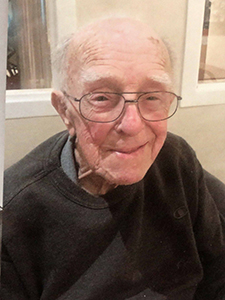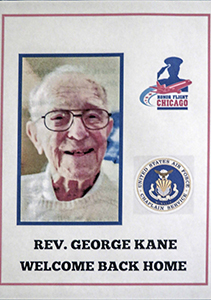Air Force Korean War Schaumburg, IL Flight date: 07/12/23
By Carla Khan, Honor Flight Chicago Veteran Interview Volunteer
The Reverend George Kane, or rather Fr. George as he prefers to be called, grew up on Chicago’s Northwest side as the second child in a family of four. His father had served in
WWI and eventually his younger brother served in the US Army in Japan at the end of WWII while his youngest brother became a US Marine who saw combat.
The Kane children attended private, catholic schools. George, who had been very impressed with the teaching staff of nuns and priests and saw them as great role models, decided to continue his further education at St. Mary’s of the Lake Seminary in Mundelein, IL. where he studied Religion. Because this field of studies had a draft exemption, George could become a priest immediately after graduation. He was assigned to a Chicago South Side parish which turned out to be a wonderful experience for him because he encountered and learned to appreciate an entirely new culture that was so different from what he had been used to.
After nine years, however, George became restless. He knew that following established hierarchy it was going to take another 25 years for him to become a pastor in his own parish and he felt ready to take leadership. The best way to do that, he figured, was by joining the military. He arranged a meeting with then Cardinal Meyer whose approval he was going to need and told him that he wanted to be his own boss for a while. The Cardinal supported the idea wholeheartedly and George was free to join his branch of choice. He selected the US Air Force because, according to Fr. George, “they are usually away from big places”. And, so it happened that in October of 1959, George found himself at Lackland AFB near San Antonio, along with five other Roman Catholic priests and various Protestant ministers, enrolled in a special training program for clergy. Since it was an introductory program, other support staff such as lawyers and doctors joined them for classes like the History of Warfare. It was an interesting time. Because George already had an advanced college degree, he immediately received the rank of Captain while some others started out as Lieutenants. Training completed; he got a two-week break to spend time with his parents in Chicago.
George’s first post was at Warner Robins AFB, just South of Atlanta, GA. where he was the first and only Catholic chaplain among chaplains of various other denominations. Together they developed excellent teamwork to support new recruits. Part of the recruits’ training was that they had to speak with the chaplain who told them that they now were not alone but were part of a larger organization. They were told about opportunities to attend worship services, and they were encouraged to stay in contact with their parents. In addition, the chaplains not only did intervention and counseling but they also considered it very important to move about the base and visit the young airmen at the places where they worked.
About a year later, in 1960, George was transferred to the far more isolated Kimpo AFB in Korea. There, highly trained and qualified US pilots taught Koreans the art of mission flying. The support group for these pilots consisted of lawyers, doctors, and priests. In addition, there were outlying radar stations where few priests ever ventured and life was so lonely that, in George’s words, “they even welcomed chaplains!” George made frequent trips and the men were always happy to see him come.
Since the air base had only 65 men, there was enough time for the chaplains to venture out into the surrounding area. George and his best friend, a protestant chaplain, had access to a truck which they drove all over the countryside. This gave them the opportunity to visit various 19th century US Catholic missions among which the most impressive was the one of the Sisters of the Sacred Heart. Here, the Sisters and volunteers alike from all over the world taught in a Catholic college and exposed local students to Roman Catholicism. George also became close friends with a Lutheran chaplain and together they visited many orphanages.
The base itself had a regular mass and the local population was welcome to attend.
The nearest village was on a hill and on Sunday mornings, George could see the villagers, all dressed up in their Sunday finest, come single file down the hill. It was an unforgettable sight. Having the villagers attend mass even encouraged more airmen to come to the chapel. In all, the program was a huge success.


After a year in Korea, George received orders that took him to Eglin AFB in Florida where he stayed for another 1¾ yrs, the remainder of his military time. The atmosphere on this Base was very different because here pilots were trained for the war in Vietnam. He ministered to men preparing for combat as well as to their families.
Rather than making the military his career, George decided that he did want more stability in his life. It was a big adjustment to re-enter civilian life but he does not regret having experienced “the best of both worlds”. His first parish was again on Chicago’s South side, after which he changed over to Mundelein Seminary where he taught for six years. Next, a new parish opened in Schaumburg, IL with the Church of the Holy Spirit and its philosophy was based on the teachings of the second Vatican Council (Vatican II). It was the perfect match because this is where Father George served the next 24 years until he finally semi-retired.
Looking back on his career, Father George mused that his life had been more influenced by the military than he had initially realized. And in a positive way. He had learned the importance of personal contact between leaders and those who needed or wanted to be led. He had learned the importance of being informal. And, he had learned the importance of various members of the clergy in a community working together.
Father George currently leads a rather active life in a Senior Community in the Chicago suburbs and in July 2023 participated in his well-deserved Honor Flight.
Father George, thank you for your service and for all you have done for your fellow citizens. Welcome Home!


